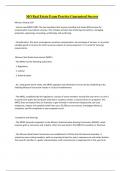MO Real Estate Exam Practice Guaranteed Success
Missouri Statute 339
- License Law RSMO 1986: This law mandates that anyone providing real estate (RE) services for
compensation must obtain a license. This includes activities like brokering transactions, managing
properties, appraising, counseling, syndicating, and auctioning.
- Consideration: This term encompasses monetary compensation, the exchange of services, or any other
valuable goods or services for which a person expects to receive payment. It is crucial for licensing
requirements.
Missouri Real Estate Commission (MREC)
- The MREC has the following authorities:
1. Regulatory
2. Judicial
3. Administrative
- As a state government entity, the MREC regulates and administers license law by establishing rules.
Violating Missouri license law results in a Class B misdemeanor.
- The MREC, established by the legislature, consists of seven members serving five-year terms. Its role is
to protect the public by having the authority to suspend, revoke, or place licenses on probation. The
MREC does not impose fines on licensees or get involved in commission disputes but can issue
subpoenas, impose civil penalties (with fines up to $2,500 per occurrence), investigate without a
complaint, and file complaints in any competent court.
Complaints and Hearings
- The MREC forwards complaints to the Missouri Administrative Hearing Commission (MAHC), which
assesses guilt or innocence and, if guilty, refers the case back to the MREC for penalties or dismissal.
- The Missouri Real Estate Commission was established in 1941 by the 61st General Assembly. It
comprises seven voting members, with six requiring at least ten years' experience as real estate brokers.
The seventh member is a public representative. Each commissioner is appointed for a five-year term.
,- Real estate brokers and salespersons must have a license to operate, with the Commission also
responsible for investigating consumer complaints against licensees and auditing real estate escrow
accounts for proper handling of buyer deposits. The Commission reviews complaints, audits, and other
matters in their regular meetings.
Missouri Administrative Hearing Commission (MAHC)
- The MAHC determines the guilt or innocence in license cases, and if a licensee is found guilty, they are
sent to MREC for appropriate action. It consists of three attorneys who work for the Attorney General,
while non-license law public crimes are forwarded to the Attorney General's office.
Types of Broker Licenses
- Brokers can possess individual (active or inactive), corporate, LLC, partnership, or non-resident
licenses. Licenses may be voided due to expiration, suspension, or revocation.
Types of Salesperson Licenses
- Salespersons can hold individual licenses (active or inactive) or broker salesperson licenses (active or
inactive).
Branch Offices
- A broker salesperson can manage a branch office (not just a salesperson), and branch offices must
operate under the principal broker’s license.
Licensing and Renewals
- Broker licenses must be renewed by June 30 of even years ($50 fee), and salesperson licenses by
September 30 of even years ($40 fee). A salesperson must have two years of experience before
becoming a broker. Brokers must notify MREC of termination within 72 hours, and salespersons have six
months to find a new broker or must go inactive. Listings are the broker's property and require written
consent for transfer. "Dual Contracts" intended to deceive lenders constitute a federal offense.
Broker Business Requirements
- Brokers must maintain an adequately sized sign at their RE office and supervise all salespersons,
retaining the same name at branch offices. They are required to have Escrow or Trust accounts unless
exempted by MREC. Brokers need to deposit funds within ten days of accepting a purchase offer.
, - Unless otherwise agreed, co-broker funds must be transferred into the listing broker's escrow account.
Accounts must be non-interest bearing unless otherwise specified in writing and only negotiable items
can be placed in escrow. Any disputes over earnest money must pause until all parties agree or, after
365 days without resolution, release the funds to the state treasury.
- Should a contract fail, brokers must notify the seller regarding the earnest money process—sending a
registered letter 60 days after the contract's failure, and if there’s no response from either party, the
broker may release the funds after 15 days.
Escrow and Listing Agreements
- Brokers must inform buyers and sellers of any escrow issues within 15 days. Net listings are illegal in
Missouri, where an owner places a minimum amount they want from the property sale, allowing the
broker to keep anything above that amount.
- Commingling or conversion relates to mishandling someone’s funds, like late deposits or unauthorized
usage.
Advertising Laws
- Discriminatory advertising is illegal and violates Federal Fair Housing Law. Inducements involving
valuable consideration for securing deals are not permitted, and any advertisement must clearly include
the broker's registered business name, salesperson contact information, and associated brokerage
information. Blind advertisements must also mention the broker's name.
Listing Agreements
- Listing agreements must detail price, commission (including bonuses), duration, signatures from the
seller and broker, and listing types (like exclusive agency). Any changes made must be initialed and
signed by all involved parties.
Dual Agency
- In dual agency situations, disclosure is mandatory, and the commission source must be written and
signed by all parties. The listing broker must inform buyers of their agency relationship with the seller
before receiving personal or financial information.
Broker Record Keeping




